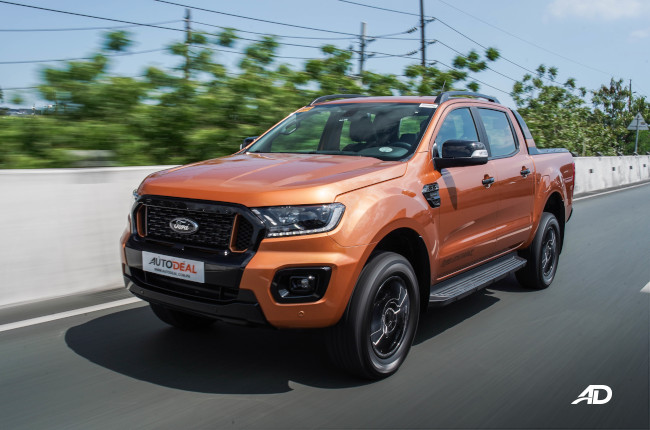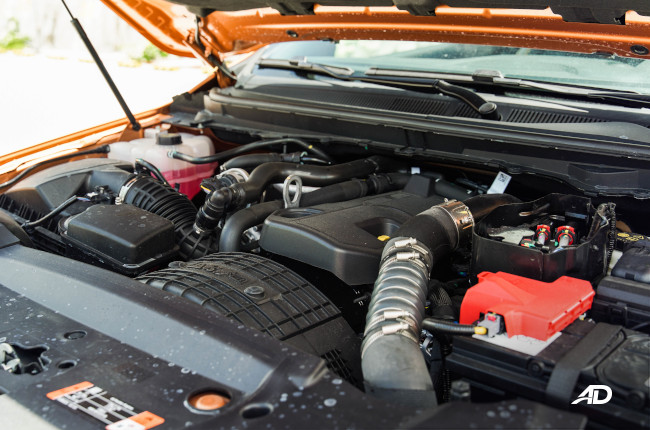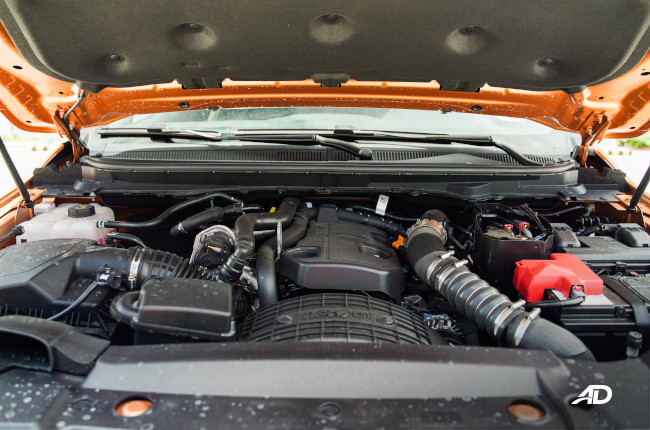2021 Ford Ranger Wildtrak Single Turbo 4×2 Review
This variant gets a lot of features packed in, at a price that is hard to resist.
Contents
At AutoDeal, we’re pretty familiar with Ford Rangers. The model has been out since 2011 across a wide variety of markets. The Philippines got an update in 2021, and the newest crop of Rangers looks to be the best batch so far. Key updates to the exterior give the Ranger a new look, even if it is based on the old platform.
If you’ve been on the fence about Ford’s Ranger for quite some time now, maybe this iteration will entice you.
Design
Exterior & Interior Design, Quality, Fit and Finish, Ergonomics 4.0/5
Safety and Technology
Convenience Technologies, Active and Passive Safety Features 4.5/5
Value for Money
Amount of the vehicle you get for the price, Fuel Efficiency 5.0/5
- Extremely good value for money at just P1,540,000
- Loaded with tech and safety features
- Tasteful exterior redesign
- Engine still gets a little noisy
- Transmission tends to hunt for gears
- Interior’s still good, but a little dated
Exterior
Nothing’s really changed from the pre-facelift. The grille is different along with a few other trim pieces. There’s still a lot to like about the Ranger’s design, but the grille adds an extra layer of gloss that breathes new life into a tried and true Blue Oval design. That being said, it’s familiar, but nothing too over the top.
The variant we’re reviewing is the Ranger Wildtrak 4×2, otherwise known as the single turbo. While it may not have a 4×4 system or the Biturbo EcoBlue diesel engine from the 4×4, FX4 MAX, and Ranger Raptor, it still has the same look as the top-tier Rangers, minus the new rolling shutter that is found on the Biturbo Wildtrak. Now, even without that, you’re still getting all the black accents and goodies that the update brings. We’re particular fans of the grille design, which is reminiscent of the FX4, but you get a bit more flair with the orange accents. It also gets LED lights in the front, and a rear that we’ve grown accustomed to. The wheels are the same size as before, coming in at 18-inches, but they now sport a glossy black paint job that matches the grille.
Overall, the redesign did some good to the Ranger Wildtrak. That being said, it’s not revolutionary either. It’s simply Ford’s effort to keep its most popular model current and with the times. In that regard, we consider it to be a valiant effort.
Interior
Whatever we’ve said in the past rings true with the current facelift. Ford has a way with its interiors. It executes it well enough so you don’t feel like you are in a bog-standard utility truck. The seats still hold up even if they are the same units we got in the previous iterations—albeit with a different upholstery pattern, but we wished that we got some new bits inside. The gauge cluster is still the same as before, and the dashboard is as familiar as ever. We still like it, however, but whatever gripes we had like some of the scratch magnet plastics, or the hollow feel of some of the interior plastics are still apparent.
The rear still features the same space as before. There’s enough space for larger individuals, but you’re still sitting upright. It’s still a pickup truck, but the legroom is still good for its segment. You get a center armrest with cupholders. You do get a 12-Volt socket for your passengers, but that’s about it.
Overall, there’s nothing spectacularly different about the Ranger Wildtrak 4×2 this time around. It’s pretty much the same. We wish that Ford worked something up to put some rear air conditioning vents at the rear, but we’re aware that design limitations may have hampered an effort to do so.
Comfort
It was comfortable then, and it’s comfortable now. The Wildtrak 4×2 is considerably lighter than the 4×4 counterpart we’ve reviewed a few years ago, but it remains as comfortable as its more laden brother. Equipped with leaf springs at the rear, and double-wishbone coil spring suspension at the front, we’re not too hot on how pickups ride, but the Ranger isn’t as utilitarian-feeling as its rivals. It does well to smooth out bumps, but at the same time retain the strength of its chassis. Though, we’re not going to compare it to a crossover like the Ford Territory, because that model is a different kind of car altogether.
NVH, as expected is superb. You get minimal intrusions from the road. Even on highway terrain tires, the sound insulation Ford installed was able to dampen most of the noise that you would expect at a higher speed. Granted, it is a pickup truck, so wind noise did creep up to noticeable levels, but it was by no means unbearable.
Technology
It’s surprising to note that the Ranger platform is quite old already, but it still has some of the best tech and safety features in the market today, except maybe for that infotainment system. Don’t get us wrong, it’s still thoroughly modern, supporting Apple CarPlay and Android Auto, but the screen size is getting a little small especially when compared to the new Isuzu D-MAX, which has a 10-inch display in the middle. We can’t judge it too much on size, since Ford was one of the first brands to standardize Apple CarPlay and Android Auto in its cars. The gauge cluster is old news, however, it’s still just adequate for today. Two TFT screens and a gauge in the center are laid out neatly, but the submenus are a bit of a hassle to get to. Your tachometer is all digital so there is a bit of lag and the display is a bit small, but it’s usable, but not too enjoyable to do so.
The speaker system is still great by today’s standards. While it’s not branded, the system does well to produce sound at a reasonable level of quality. Being a Wildtrak, it has 6 speakers, which means a 4+2 configuration with the two being tweeters. As usual, the highs were better defined and the lows were somewhat lacking.
Apart from that, Ford’s execution of its adaptive cruise control and automatic braking are all top-notch. It’s sensitive enough to detect incoming hazards, but not too sensitive that it will induce panic in the cabin. It also has a reverse camera, with parking sensors in the front and rear. It’s pretty much the complete package and one of the best tech loadouts for any vehicle at this price point.
Safety
Safety-wise it’s got up to 6 airbags, ABS with EBD, Pre-Collision Assist with Pedestrian Detection, driver alert system, lane keep assist, adaptive cruise control with forward collision alert, active park assist, electronic stability control with roll-over mitigation and traction control, hill-start assist, an alarm system, and ISOFIX tethers.
These specs are the same as the Wildtrak 4×4 save for hill descent control, but even to this day, The Ranger still stacks up in terms of tech and safety features. It took several brands several years to catch up, and Ford was giving its trucks good load-outs since day 1.
Driving
The 2.0-liter Biturbo engine gets a little noisy under some load, and the single turbo engine sounds the same way. There is a bit of a delay when it comes to power—still, but the top end of the rev range is admittedly a bit shy. Power and torque figures of the 2.0-liter single turbo are at 180 hp and 420 Nm of torque respectively. There is a big difference compared to the Biturbo, and it shows. Acceleration doesn’t surge as much, but the engine features a good amount of usable power and torque. Daily driving the Ranger will be very doable, as it is a more road-going pickup given that it is only 4×2, but the 10-speed automatic transmission has a tendency to hunt for gears and lag slightly.
Handling-wise, it does well to turn the corner. Ford’s well-known for its light steering even on the biggest of its cars. The Ranger is no exception as its power steering motor makes going lock to lock extremely effortless for a pickup truck. If you blindfolded us and told us to turn the wheel, it would have given us the impression that we were in a smaller car. The steering is also smooth but lacks a bit of feedback. Couple that with the stable ride, and you got yourself a pleasant drive.
At speed, when you really wring out the engine and throw yourself into a corner, the Ranger won’t handle like it is on rails. The Ranger is quite heavy, so body roll will be felt throughout the corner. The brakes, however, are pretty good for what it is. You get a good feel and a nice bite on the way down. It’s not too spongy like other pickups, and overall, it’s a fine truck to drive.
Fuel Economy
We were able to get 8.8 km/L in the city with the Wildtrak 4×2. We were, however, able to push this car a little bit on the highway, which netted us a figure of 15 km/L while behaved.
While these figures are plenty good, we did expect a little more in terms of fuel economy. That being said, it’s not terrible, but we wished that the 10-speed automatic transmission would have given us a little bit more juice.
Verdict
Overall, we’re not too underwhelmed. There were a lot of toys in the old Ranger, and the new one just looks like the business compared to the old one. It still rides the same and has the same great features that put the Ranger on the map for many car enthusiasts and many urban warriors alike. While we’re not too keen on how little has changed, we’re still gushing about how great the value proposition is.
Coming in at just P1,540,000, it’s the same price as the mid-range offerings of other brands’ pickups. For this price, you get even more tech than the other mid-rangers, but you also get top-of-the-line trimmings. To access these high-end features with other brands, you’ll have to pay over P1,600,000. Tech-wise, the Ranger Wildtrak 4×2 simply goes toe to toe with top-of-the-line giants like the Isuzu D-MAX, Nissan Navara, and Toyota Hilux, but it either matches or outclasses them in terms of tech and safety features, for over P100,000 less.
That being said, you will have to work with a chassis and general design that is a bit long in the tooth already, but considering how the Ranger seems to not age over time, we’d say that nobody will really notice your truck aging too much over time.







